 Petzlover
Petzlover Coonhound is originated from United States but Manchester Terrier is originated from United Kingdom. Coonhound may grow 39 cm / 16 inches higher than Manchester Terrier. Coonhound may weigh 30 kg / 67 pounds more than Manchester Terrier. Coonhound may live 3 years less than Manchester Terrier. Coonhound may have more litter size than Manchester Terrier. Both Coonhound and Manchester Terrier requires Low Maintenance.
Coonhound is originated from United States but Manchester Terrier is originated from United Kingdom. Coonhound may grow 39 cm / 16 inches higher than Manchester Terrier. Coonhound may weigh 30 kg / 67 pounds more than Manchester Terrier. Coonhound may live 3 years less than Manchester Terrier. Coonhound may have more litter size than Manchester Terrier. Both Coonhound and Manchester Terrier requires Low Maintenance.
 The Coonhound, hailing from the United States of America, is a scenthound or hunting dog of which there are 6 distinct breeds which are recognized by the United Kennel Club.
The Coonhound, hailing from the United States of America, is a scenthound or hunting dog of which there are 6 distinct breeds which are recognized by the United Kennel Club.
Because foxhounds were regarded as inadequate for hunting, people started looking at the developlent of other hounds who had a keen sense of smell and the ability to track and animal effectively and without necessarily a human commanding it.
Foundation dogs were selected because of their keen sense of smell and Bloodhounds were also added to the Coonhound line to provide the Coonhound with superb tracking skills. Its precise origins are unknown but it is believed that many of the European hunting hounds were involved in its development as well as the Kerry Beagle and the FrenchBleu Gascogne hounds.
It was in 1912 that the first Black and Tans were registered with the United Kennel Club. In 1945 the American Kennel followed.
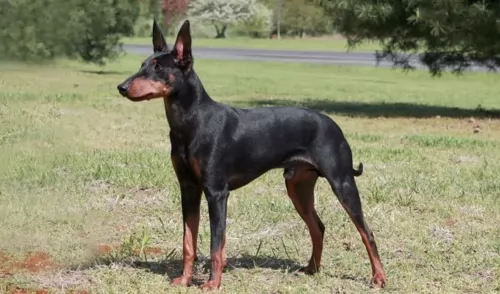 Looking much like the Black and Tan Terrier, the Manchester Terrier is a dog that was actually developed from the Black and Tan, which is the oldest known breed of terrier.
Looking much like the Black and Tan Terrier, the Manchester Terrier is a dog that was actually developed from the Black and Tan, which is the oldest known breed of terrier.
In the United States there are 2 varieties of the Manchester Terrier — the Toy and the Standard but in the UK the 2 sizes are classified as different breeds - the English Toy Terrier and the Manchester Terrier.
The dog was first bred in the 19th century to wipe out rats and mice, originating from Manchester, England. This is an old dog breed, gaining the nickname of the Gentleman's Terrier because of its dignified looks and personality.
After the 2nd World War, the numbers of the dog dropped and this spurred the kennel club to list it as a vulnerable native breed, in danger of extinction. It was in 1937 that the British Manchester Terrier Club was formed.
 Known also as the Black and Tan Coonhound, the Coonhound is a medium to large dog weighing 23–34kg and standing at 53-69cm. He makes an exceptional pet.
Known also as the Black and Tan Coonhound, the Coonhound is a medium to large dog weighing 23–34kg and standing at 53-69cm. He makes an exceptional pet.
He has a short, dense coat of black and tan in color with tan markings around the muzzle. He has long, floppy ears and a long tail. With his long, strong, muscled legs he is able to pick up speed when on the hunt. He is known for his deep, booming bark.
The Coonhound isn’t as jaunty as some other dog breeds but he is social, playful and friendly. He is even tempered and sensitive, and you’ll know when you’ve hurt his feelings as he gets a look about him of utter misery.
He definitely isn’t suited to apartment living and being left on his own, and is therefore not suited to an owner who works all day and leaves him on his own. They just love human companionship, and enjoy taking part in all the activities of their owner's life.
Early training and socialization will be necessary to ensure he grows up calm, obedient, relaxed and confident. When he has been socialized he makes an excellent family pet, getting on well with children as well as with other pets in the home.
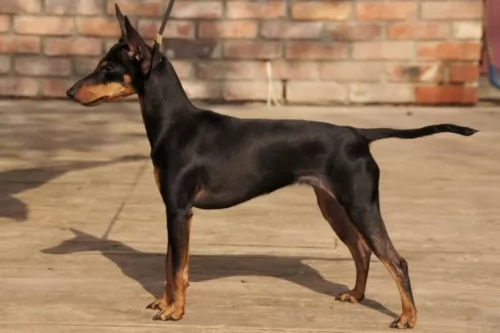 The Manchester Terrier is a small, smooth haired dog with a black and tan coat and a head with a fairly long muzzle, small bright eyes, largish erect ears and a deep chest.
The Manchester Terrier is a small, smooth haired dog with a black and tan coat and a head with a fairly long muzzle, small bright eyes, largish erect ears and a deep chest.
The body is lean and muscular and the tail, where once docked, now tends to be left long. In the toy sized dog you will find him standing at roughly 25 – 30cm in height and he will weigh between 2 to 4kg. The standard sized dog will be slightly taller and heavier and weigh in the region of 8kg.
You can expect between 2 – 4 puppies from a breeding pair.
Feisty, energetic, alert and intelligent are some of the words which describe the Manchester Terrier. Like any other dog, training and socialization will make him a splendid pet, obedient and amicable among people.
He is loving and loyal, courageous and feisty and guaranteed to make you an eager-to-please pet. He can adapt to life in the city or countryside, but is going to need plenty of exercise wherever you keep him as a pet.
 The Coonhound is often described as a carefree, happy-go-lucky type of dog breed who is social and who just loves to spend time with his human family.
The Coonhound is often described as a carefree, happy-go-lucky type of dog breed who is social and who just loves to spend time with his human family.
They just love their human family, and are full of mischievous tricks, being amusing and entertaining for the family.
He is a playful, gentle dog and he seems to keep his puppy nature much longer than with other dog breeds, but this is part of his appealing nature. He isn't a dog breed for everyone as some dog owners might want a more serious breed, but when trained and socialized, he promises to turn out to be an adored family pet.
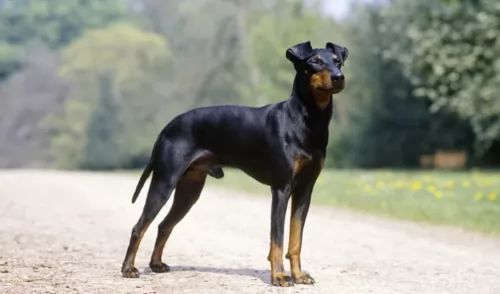 The Manchester Terrier has so many good qualities that make him such a good pet. Low maintenance, he is clean and well groomed to look at. He is also a healthy dog breed, nice and active and low maintenance.
The Manchester Terrier has so many good qualities that make him such a good pet. Low maintenance, he is clean and well groomed to look at. He is also a healthy dog breed, nice and active and low maintenance.
This little dog is willing to come into your home and heart. He will make you a wonderful pet and friend for as long as 15 years if you take special care of him.
 Coonhounds usually enjoy very good health, but they can still suffer with any one of the more common dog illnesses there are. They’ve got long ears so they are more prone to ear infections. Also, hip dysplasia has been recorded too.
Coonhounds usually enjoy very good health, but they can still suffer with any one of the more common dog illnesses there are. They’ve got long ears so they are more prone to ear infections. Also, hip dysplasia has been recorded too.
It is why so many breeders opt to have their dogs certified by the Orthopedic Foundation of America.
Ear infections in dogs with long ears are common and most dogs who suffer with an ear infection will scratch at the ears and shake their heads. There can also be redness in the ear.
Mites, bacteria and yeast are all common problems, and your veterinarian can treat it and show you how to clean the dog’s ears to keep them free from infection in the future.
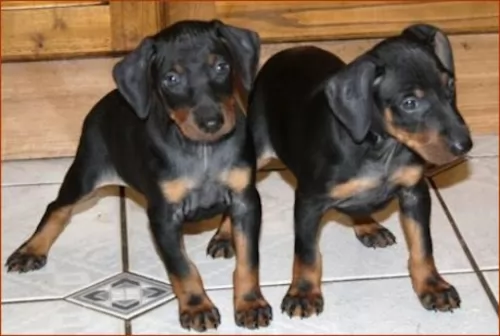 This dog breed is fairly healthy and can reach a good age if looked after well. Every dog though, can be affected by a number of inheritable genetic disorders.
This dog breed is fairly healthy and can reach a good age if looked after well. Every dog though, can be affected by a number of inheritable genetic disorders.
Glaucoma is a common genetic condition in Terrier breeds, including the Manchester Terrier. Secondary glaucoma, which is known as lens luxation is brought about when there is excessive pressure in the eyeball. The lens of the eye is put out of alignment. Most times surgery is the solution.
Von Willebrand's Disease is a blood disorder that affects the clotting process. A dog with this disease will have bleeding gums, continuous bleeding after surgery and sometimes blood in the stool. It’s a disease which can’t be cured but it can be managed with treatments.
 Your Coonhound will want a lot of exercise. While you keep him on a leash when walking him or allowing him to run while you cycle, he’ll also want a place where he can run off the leash.
Your Coonhound will want a lot of exercise. While you keep him on a leash when walking him or allowing him to run while you cycle, he’ll also want a place where he can run off the leash.
Even though the Coonhound is a short haired dog, he does shed. Making use of a rubber curry brush, brush him down twice a week to maintain his beautiful black, velvety coat.
Because he is an athletic outdoor dog, he may be more prone to picking up ticks and fleas and there are excellent shampoos available that keep these parasites at bay for a good many days.
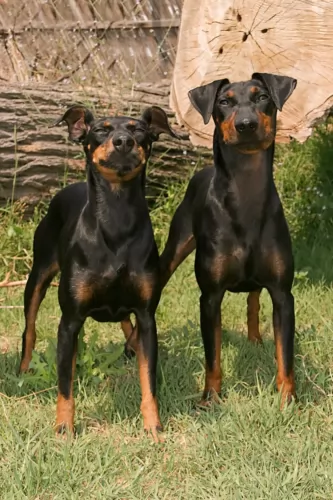 Low maintenance, the Manchester Terrier will only require a brushing once or twice a week. Check his eyes and ears for infections, clip his nails and brush his teeth 2 or 3 times a week.
Low maintenance, the Manchester Terrier will only require a brushing once or twice a week. Check his eyes and ears for infections, clip his nails and brush his teeth 2 or 3 times a week.
The Manchester Terrier is a lean, muscular dog and you want to be sure to keep him that way. If you feed him commercially manufactured food, make sure that it is one of the high quality brands – food which is packed full of vitamins and minerals to ensure the health of your dog.
Any packaged food you buy should be appropriate to the dog’s age and his activity levels. You won’t be doing your dog a favor by feeding him treats that you enjoy such as chocolate, coffee, peanuts, raisins, grapes and onions.
Dogs want simple food that don’t change much. Keeping things simple prevents upset stomachs. Give him some wholesome home-made food occasionally to add into his dry kibble. This can be boiled chicken, brown rice or pasta and some cooked or raw vegetables such as potatoes, carrots and spinach. Some raw meat added in from time to time can also do wonders for your dog. Make sure he has access around the clock to fresh, cool water.
The Manchester Terrier wants lots of exercise, and apart from him having his regular daily walks, he will need runs off the leash in the park. If you go cycling for instance, he will readily run beside you.